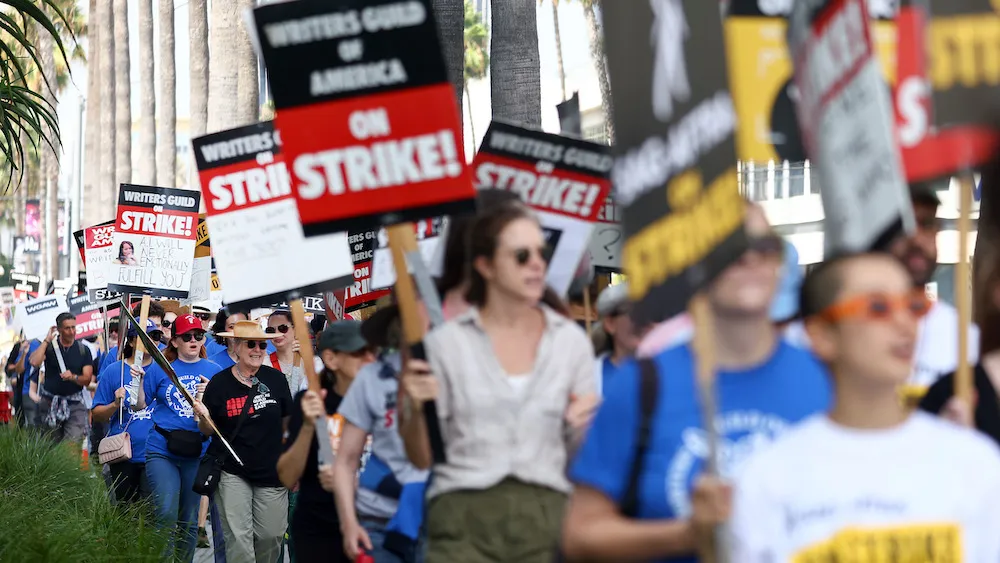Via Zoom, we sat down with television writer Jeremy Levick from his home in Brooklyn, New York. We discussed the current Writers Strike and its impact on the out-of-work writers as well as the entertainment industry as a whole. The Writers Guild of America (WGA) is a union that negotiates and manages contracts that protect the economic and creative rights of the writing community. The WGA represents over 11,000+ television and film writers. Jeremy is a proud 2012 graduate of Harriton High School and a 2016 graduate from NYU Film School.
THB: Can you explain the primary reasons for the strike and what the WGA hopes to achieve with this?
JL: “So, every three years the WGA (Writers Guild of America) negotiates with AMPTP (The Alliance of Motion Picture and Television Producers) which is a group that represents the major Hollywood Studios and huge companies such as Netflix, Amazon, Disney and so on. The negotiations had failed after six weeks and that’s when the WGA went on strike (on May 1st)…The purpose is that the writers are trying to get higher pay and a more stable pay structure. Streaming is also a big part of this; before streaming most TV writers would work on a show and be employed for most of the year – it would be most common in that time for writers to work on a show where they’d order 20 or so episodes and work on that for most of the year. But now with streaming, it’s common to just work on 8 episodes of a show. An example is the show I was working on (What We Do In The Shadows), I had been working for ten weeks and once it was over I had to look for a new job.”
THB: What is it like being a writer participating in the writers strike?
JL: “It’s interesting, I’ve never participated in a strike. It’s been difficult financially but it’s also been energizing to be on the picket lines talking to other members of the union. Yeah, It’s cool. It’s fun to be around people who want the same outcome.”
THB: What are the issues of each side/what is your union looking for?
JL: “Overall, the Union wants writing to be a sustainable profession. While the AMPTP wants to cut costs and don’t want to spend more money – they don’t make money from streaming and they don’t want to reimburse the writers for that. Those two things are at odds with each other.”
THB: Do you think there is enough awareness regarding the situation to help your cause?
JL: “Yeah, there seems to be a lot of awareness and public support. I’m told this wasn’t as much the case during the last writers strike in ‘07 and ‘08. For whatever reason, it’s been reported on a lot which is nice and a lot of people seem to know and are about it – they sympathize with the writers, which is awesome because I’m a writer.”
THB: Are fellow WGA members holding up as well financially as you?
JL: “They’re having a hard time, from what I hear. ‘Cause no one has been able to do their job since May and they want to work – but I think they know that the industry was looking so bleak for them before the strike and that they would rather not work right now then work under the conditions that the AMPTP wants them to.”
THB: (My understanding is that) the studios will start using ChatGPT which will potentially eliminate jobs; is that a legitimate threat? What’s your view on that?
JL: “That’s a great question. I’m not an expert on AI but I know that a lot of writers are really scared about it. From what I understand, the studios have begun to see it as a tool and a way of saving money on writers labor. So it’s important for the writers to put guard rails on that if only because the studios want to keep it on the table to not pay the writers in some areas. It probably can’t come up with those good creative ideas but who knows what the future holds. But I heard it’s being considered in a way where the studio asks ChatGPT to write a first draft and then have writers polish and finalize the draft. I just think it should be done by people.
THB: “What kind of support have you received from other WGA members?”
JL: “There’s been a lot of solidarity between the members and everyone seems to be pretty united. Theres good energy on the picket lines and stuff. I feel like I’m in it with a big group of people which is really nice.”
THB: “When do you believe that the strike as a whole will be over?”
JL: “Today, Wednesday, the studios have agreed to go to the negotiating table with the WGA but who knows what that’ll turn into. I’m hopeful and I think it’ll be over by the end of the year.”
THB: Is there anything the public can do to support the WGA?
JL: “There is something called the entertainment community fund and you can donate to support members of The Entertainment Community who are struggling with the strike. But I guess for people of your age, high school and below, don’t donate your money – you need it. But you could go to a picket and possibly join it. You could make a sign and it could be really fun to protest.”
As of this writing this, there has been a tentative agreement between the writers and the studios. We thank Jeremy so much for sitting down with us and encourage you all to learn more on this nuanced topic!



